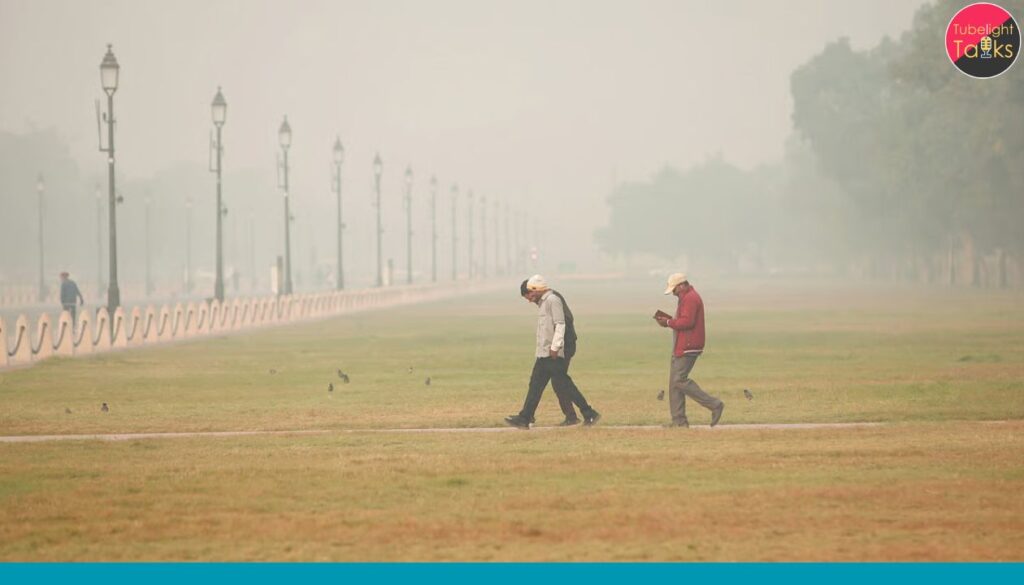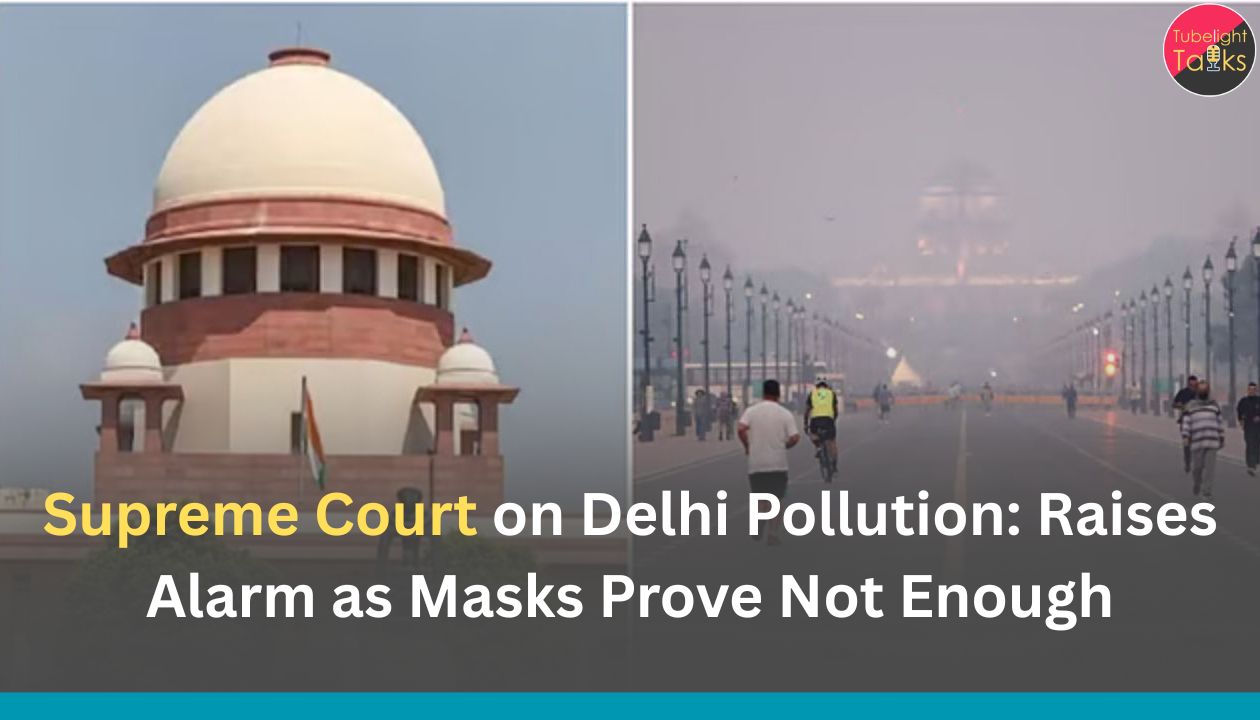Supreme Court on Delhi Pollution: Raises Alarm as Masks Prove Not Enough
Supreme Court on Delhi Pollution: Delhi is once again struggling to breathe. The capital city is covered under a thick layer of toxic smog, and the air quality has fallen to dangerous levels. The Supreme Court of India has expressed serious concern over the situation, calling it “life-threatening” and warning that wearing masks alone cannot protect people anymore.
Court’s Concern and Strong Message
During a hearing on Delhi’s worsening air quality, the Supreme Court stated that the pollution levels have crossed all safe limits. The judges said that the situation is so bad that “people are living in a gas chamber.” The Court expressed special concern for children, elderly citizens, and patients with asthma or heart problems. It said that such toxic air can cause long-term damage to people’s lungs and hearts.
The bench suggested that senior lawyers and government officials attend hearings through virtual mode to reduce health risks. Schools in Delhi have already shifted to online classes due to poor air quality, and many people are avoiding outdoor activities completely.
Why Is Delhi’s Air So Polluted?
The main cause of the smog is stubble burning (parali jalana) in the nearby states of Punjab, Haryana, and Uttar Pradesh. After harvesting paddy, many farmers burn the leftover straw to clear fields for the next crop. The smoke from this burning travels towards Delhi and mixes with city pollution, from vehicles, factories, and construction dust, creating a dangerous blanket of smog.
Experts also say that low wind speed and cooler temperatures during winter trap pollutants near the ground, worsening the situation. Despite several meetings and orders, the Supreme Court noted that the government has not taken strong enough action to stop stubble burning and reduce emissions.
Government Actions So Far
The Delhi government has announced several emergency measures, including:
- Odd-Even Vehicle Scheme: Allowing cars on alternate days based on their number plates.
- Ban on Construction and Demolition: To reduce dust pollution.
- Closure of Schools: Classes held online for the safety of students.
- Ban on Entry of Trucks: Except those carrying essential goods.
- Work From Home: For government offices and advisories to private companies.
However, the Supreme Court said these steps are temporary and not enough. It directed all concerned states and the central government to prepare a long-term plan to stop this crisis from repeating every year.
Impact on Health
Doctors in Delhi report a sharp rise in cases of breathing difficulty, throat pain, eye irritation, and cough. Hospitals are crowded with patients suffering from asthma and other respiratory diseases. Medical experts warn that the air quality in Delhi is equal to smoking 20 to 25 cigarettes a day. Long exposure can lead to chronic lung diseases, heart problems, and even cancer.

Health experts recommend:
- Staying indoors as much as possible.
- Wearing N95 or N99 masks when going out.
- Using air purifiers at home.
- Avoiding morning walks or outdoor exercise.
- Drinking plenty of water and eating fruits rich in Vitamin C and antioxidants.
Citizens React with Fear and Anger
Residents of Delhi are frustrated and worried. Many are complaining that the same situation repeats every winter but no permanent solution is found. Parents say their children are falling sick frequently, while office workers report fatigue, headaches, and irritation in the eyes. On social media, people are demanding immediate action and accountability.
Online reactions show mixed emotions
Follow health advisories strictly
Demand stricter pollution control
Work from home or avoid outdoor exposure
Express frustration, want urgent government action
Environmental groups say this is not just Delhi’s problem, the entire northern region faces similar air quality issues every winter.
Supreme Court’s Warning to Governments
The Supreme Court has reminded both the Centre and state governments that clean air is a fundamental right under Article 21 of the Constitution (Right to Life).
The bench has ordered all governments to submit detailed reports on the steps being taken to:
- Stop stubble burning permanently.
- Control industrial and vehicle emissions.
- Reduce construction dust.
- Improve public transport and promote green fuels.
The Court made it clear that if governments fail to act now, the situation will only worsen in the coming years.
The Road Ahead
Experts believe India needs a long-term national clean air strategy that focuses on:
- Providing machinery and incentives to farmers for managing crop residue without burning.
- Shifting to electric vehicles and renewable energy.
- Increasing green spaces and tree cover in urban areas.
- Strictly enforcing pollution control laws across industries.
- Raising public awareness on air pollution and health impacts.
Environmental and Social Harmony
Sant Rampal Ji Maharaj organizes six grand spiritual gatherings (Bhandaras) every year across his 13 ashrams in India. During these events, a special Jyoti Havan Yagya is performed, which is conducted in an eco-friendly manner that helps reduce pollution and purify the environment.
His spiritual discourses (satsangs) emphasize moral purity and positive thinking, encouraging people to live with compassion and self-discipline. When human thoughts and actions become pure, negative tendencies decrease, and the overall positive energy in the universe increases. Through such practices, Sant Rampal Ji Maharaj inspires people to contribute toward both inner peace and environmental balance.
Clean Air is Human Right
Delhi’s air pollution crisis has become an annual health emergency. The Supreme Court’s warning shows that immediate, serious, and united efforts are necessary. Temporary bans and schemes may help for a few days, but real change will only come through long-term planning and cooperation between citizens and governments.
Until then, residents are advised to protect themselves, stay informed, and avoid unnecessary exposure. Clean air is not a luxury, it’s a basic human right that must be protected for everyone.
Read Also: Noida Puts GRAP-III Into Force: What Stops, What Continues, and How Compliance Will Be Enforced
FAQs: Supreme Court Warns Delhi Pollution
1. Why is Delhi’s air pollution getting worse every winter?
Because of stubble burning, vehicle emissions, industrial smoke, and construction dust that mix and get trapped in the air during cold weather.
2. What did the Supreme Court say about Delhi’s pollution?
The Court called it “severe and life-threatening,” saying even masks aren’t enough and governments must act immediately.
3. What is the government doing to reduce pollution?
Measures include the odd-even rule, construction bans, truck restrictions, and school closures, but these are temporary steps.
4. How does this pollution affect health?
It can cause breathing problems, lung infections, asthma, and heart diseases. Long-term exposure may even lead to cancer.
5. What can citizens do to protect themselves?
Stay indoors, wear N95 masks, use air purifiers, and avoid outdoor exercise until air quality improves.
6. Is stubble burning the only reason for the smog?
No. It’s a major reason, but vehicles, factories, and weather conditions also make the situation worse.











Discussion (0)